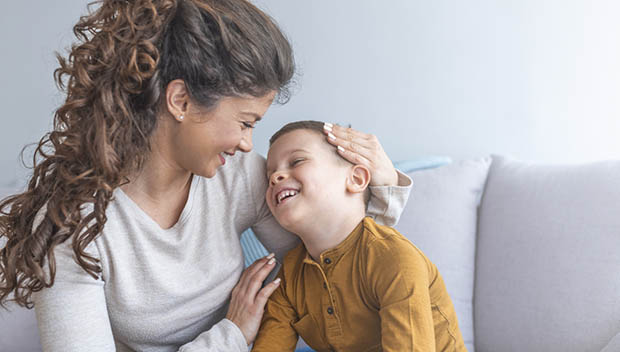
Store aisles are full of chocolates, TV commercials are full of hearts and school hallways are lined with pink and red crafts. February is in full swing, and with Valentine's Day just around the corner, love is in the air!
When we think about Valentine's Day, we often think about romantic love, or love for other people we care about. And while it's important to show our loved ones how much we care, it's also important to give ourselves love. As you're helping your children create their Valentines for friends and classmates, be sure to talk to them about self-love, too.
What Is Self-Love?
According to Psychology Today, "Self-love is not simply a state of feeling good. It is a state of appreciation for oneself that grows from actions that support our physical, psychological and spiritual growth. Self-love is dynamic; it grows through actions that mature us."
Self-love is something we develop throughout our lives, and it needs some check-ins now and then. We feel self-love when, despite our shortcomings, bad days, worries or failures, we know we are at peace with ourselves.
Why Is Self-Love Important?
Self-love is important because it allows us to feel compassion toward ourselves. If we spend too much time feeling negatively about our weaknesses, flaws or obstacles, we begin to develop low self-esteem. When left unaddressed, this could lead to more serious issues like depression or anxiety.
Low self-esteem can be particularly detrimental for children, who may not be able to rationalize a rude comment from a peer or a low test score. Strong self-love can help children manage negative feelings and situations and will give them a solid emotional foundation to help them in their teenage and young adult years.
How Can I Teach My Kids Self-Love?
Teaching your kids about self-love isn’t as complicated as it may seem. Here are a few ways you can get the ball rolling:
- Talk to your kids about some things they’re proud of or skilled at. Did your son learn a new song on his trumpet? Did your daughter score a goal for her soccer team? Write down a “proud list” and place it somewhere visible. Whenever your kids have a bad day or start to compare themselves to others, you can bring them back to their “proud list.”
- Ask your children who they enjoy spending time with and why that person is fun to be around. Is that person nice to other people? Does he or she share toys or tell good jokes? When we spend time with those who make us feel good, we feel loved and accepted.
- Remind your kids that often times, a big problem is probably smaller than it seems—and certainly doesn’t deserve our stress! If you can’t learn to tie your shoes, you just need some extra practice. If you’re struggling with a math problem, asking for help makes you smarter—not dumber. If you accidentally hurt someone’s feelings, a sincere apology is a good place to start. Finding ways to put problems into perspective can help us keep our cool.
- Look for ways to help others or volunteer your time as a family. Doing kind things for others makes us feel good!
- Talk to your kids about the importance of building healthy habits. Sleep, exercise and a balanced diet are big parts of ensuring we’re feeling our best, and when we feel our best, it’s easier for us to manage stress, tackle challenges and enjoy our favorite activities.
READ THIS NEXT: 14 Healthy Valentine's Day Recipes Everyone Will Love









Discuss This Article